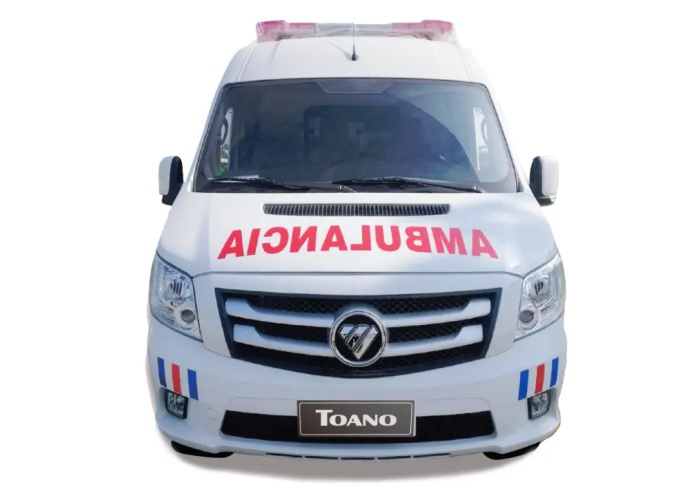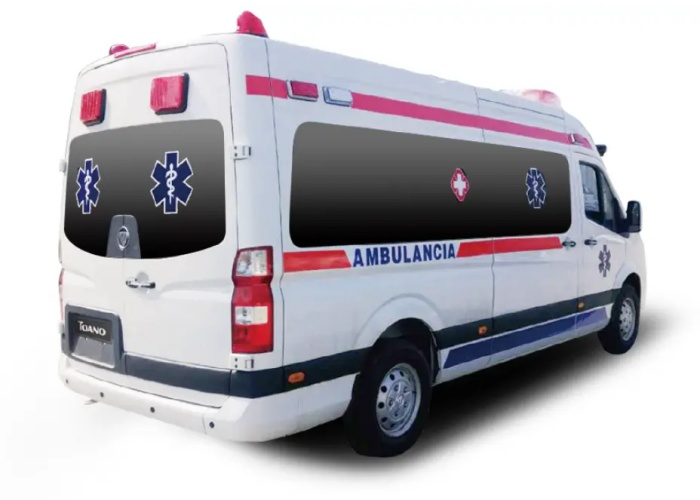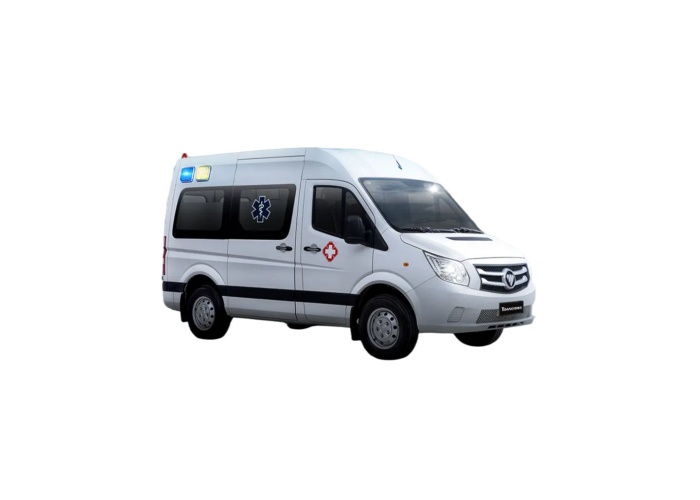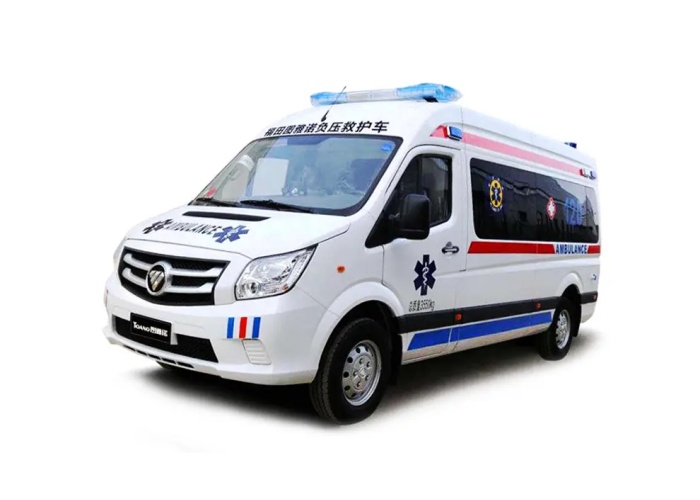From the EU's Digital Sovereignty Struggle to Ghana's "Health Sovereignty": How Foton Ambulances Emerge as a Strategic Choice for National Public Health Security
24 Aug 2025
Preamble: A Political Storm in Brussels and its Profound Implications for Ghana
On August 26, 2025, a piece of news captured the headlines of global media outlets: facing the threat of tariffs from then-U.S. President Donald Trump, the European Commission steadfastly reaffirmed its "sovereign right" to establish rules for economic activities within its own territory. The statement from the Commission's chief spokesperson, Paula Pinho, was resolute: "It is the sovereign right of the EU and its member states to regulate economic activities in their own territory." This confrontation, centered on the Digital Markets Act, fines levied against U.S. tech giants, and accusations of "discriminatory measures," was, on the surface, a battle over digital taxes, market regulation, and transatlantic trade. At its core, however, it was a defense of something far more fundamental: the "autonomy" and "control" of a nation—or a union of nations—over its own destiny.
For Ghana, a nation in West Africa, this news might seem distant and irrelevant. A dispute over digital regulations appears to be a world away from the daily concerns of Ghanaians regarding health, transportation, and development. However, if we peel back the layers of technology and trade jargon to examine the underlying logic of "sovereignty," we discover a striking parallel. The struggle the EU is waging today in the digital realm holds a valuable and deeply relevant lesson for Ghana as it faces critical decisions in building its national public health security system.
The EU is defending its "Digital Sovereignty"—the ability to ensure the future of its digital economy, the security of its citizens' data, and the fairness of its market, free from the domination and definition of a few external superpowers or multinational corporations. Ghana, as a proud nation committed to the grand vision of "Ghana Beyond Aid" and the pursuit of true independence and prosperity, must now defend and construct what can be called its "Health Sovereignty." This "Health Sovereignty" is the core capacity of a nation to autonomously, efficiently, and sustainably protect the life and health of every single one of its citizens. It is not a mere slogan but a tangible system built upon solid pillars: sound medical policies, sufficient healthcare professionals, a reliable supply of medicine, and—in moments of crisis—an autonomous and controllable emergency medical response system capable of racing against death.
The veins and arteries of this system are the ambulances that traverse its cities and countryside. Therefore, the choice of an ambulance ceases to be a simple procurement issue; it becomes a matter directly linked to the quality and future of Ghana's "Health Sovereignty." This analysis, using the EU's defense of its "Digital Sovereignty" as a mirror, will delve into why choosing FOTON ambulances is a wise and visionary strategic decision for Ghana to defend and strengthen its "Health Sovereignty," both today and for the future.
Chapter 1: The First Lesson from the News – Autonomy is the Cornerstone of National Development; Beware the Trap of "Path Dependency"
The root of the EU's dispute with the U.S. lies in its realization that, over several decades, Europe had developed an excessive "path dependency" on American tech giants. From operating systems to social media and search engines, the European market was all but monopolized by U.S. companies. This dependency not only led to an outflow of economic profits but, more critically, it left Europe vulnerable and constrained in areas such as data security, rulemaking, and even public opinion. The European Commission's hefty fines on Apple and Meta were a decisive move to break this dependency, reclaim regulatory authority, and exercise its sovereignty. Spokesperson Thomas Reynier's emphasis that the "EU digital rules are broad in scope and not specifically targeting U.S. companies" precisely illustrates the EU's intent: to build its own universal standards, rather than merely reacting passively to external pressure.
What is the lesson here for Ghana's public health infrastructure?
In the domain of emergency medical equipment, particularly ambulances, Ghana and many other African nations have historically exhibited a similar "path dependency." For years, brands from Europe and North America have dominated the high-end market through their first-mover advantage and brand prestige. However, this reliance has created a host of hidden challenges that quietly erode Ghana's "Health Sovereignty":
A High Total Cost of Ownership (TCO): These vehicles are not only expensive to purchase initially, but their subsequent maintenance costs and the price of original spare parts are prohibitively high. For the Ghanaian government and its healthcare institutions, which operate on limited budgets, this means that for the same amount of funding, fewer ambulances can be procured and kept operational, directly limiting the reach of emergency medical services.
A Fragile Supply Chain: Critical components must be imported from distant Europe or North America, involving long shipping times and complex logistics. When an ambulance breaks down, it can be out of service for weeks, or even months, waiting for a single, crucial part. In emergency medical services, where every second is tied to a life, this inefficiency, caused by a supply chain controlled by others, is a direct threat to "Health Sovereignty."
A Design Philosophy Unsuited to Local Conditions: Many Western ambulance models are designed based on the smooth, well-maintained roads and temperate climates of their home countries. Ghana's terrain, however, is complex and varied—from the congested streets of Accra to the rugged dirt tracks of the northern regions. This demands far more from a vehicle's chassis strength, suspension resilience, engine durability, and its ability to withstand high heat and humidity. This design "unsuitability" leads to higher failure rates and shorter operational lifespans.
Just as the EU is determined to break free from its digital path dependency, Ghana must undertake a strategic reassessment in building its emergency medical system. The choice of a solution cannot be based solely on a brand's historical reputation; it must be based on whether it empowers Ghana to build an "autonomous and controllable" system. Foton, a leading commercial vehicle brand from China—the world's largest developing country and a key partner to many African nations—offers an ambulance solution precisely designed to break this dependency. Foton's philosophy is rooted in tackling complex road conditions and delivering exceptional value. Its global supply chain, especially its close cooperation with African nations, ensures the accessibility of parts and the responsiveness of service. To choose Foton is to choose a path that places "Health Sovereignty" firmly in Ghana's own hands—a powerful, practical application of the principle of "regulating its own activities in its own territory."
Chapter 2: The Second Lesson from the News – A True Solution Must Be Inclusive and Non-Discriminatory
In response to U.S. accusations of "discriminatory measures," the EU spokesperson clearly stated that its digital rules are "broad in scope," intended to create a fair environment for all market participants, not to target any specific entity. This principle is equally applicable when evaluating the quality of a public health solution. A truly excellent emergency medical system must be characterized by its "inclusivity" and "non-discriminatory" nature. It must be able to cover every citizen in need, as equitably as possible, regardless of whether they live in a bustling capital city or on a remote rural path.
How does the Foton ambulance embody the principles of inclusivity and non-discrimination?
One of the greatest barriers to inclusive healthcare is cost. One of the most significant advantages of Foton ambulances is their outstanding cost-effectiveness.
Maximizing Fleet Size, Expanding Geographic Coverage: For the same budget, choosing Foton means acquiring a larger number of ambulances. This is not about sacrificing quality for a low price; it is the result of China's mature automotive industry, efficient production management, and economies of scale. More vehicles directly translate into a wider service network and shorter response times, allowing emergency care to reach remote and underserved communities that were previously "discriminated" against by high-cost equipment. This is the first step toward achieving healthcare equity.
Lowering Operational Barriers, Ensuring Service Continuity: Foton ambulances are relatively inexpensive to maintain, their technology is mature and reliable, and the technical skills required for repairs are more accessible. This means that local, smaller workshops can handle routine maintenance and most repairs, reducing the reliance on a few large service centers in major cities. The enhanced "maintainability" of the vehicles ensures a high operational readiness rate for the ambulance fleet. This breaks down the barriers created by technological and parts monopolies, making continuous, stable emergency medical service a reality.
Powerful Customization to Meet Diverse Needs: Ghana is a large country with diverse needs. Mountainous regions may require 4x4 vehicles with superior off-road capabilities; densely populated cities may need more agile and compact models; long-distance transfers demand larger, fully-equipped mobile intensive care units. Foton has a rich product line and strong customization capabilities, offering a "menu" of choices—from basic transport to advanced life support, from 2WD to 4WD, and various configurations—tailored to the specific requirements of Ghana's Ministry of Health. This flexibility ensures that every dollar invested precisely meets a specific need, avoiding a one-size-fits-all, expensive, and inflexible approach. This optimal allocation of resources is, in itself, a deeper form of inclusivity.
The EU's digital rules aim to give small and medium-sized enterprises a fair chance to compete in a market of giants. Similarly, Foton's solution aims to give every ordinary citizen of Ghana a fairer, more timely chance at life-saving care, regardless of their wealth or location. This is the most fundamental respect for and guarantee of "Health Sovereignty."
Chapter 3: The Third Lesson from the News – Strength and Adaptability are Fundamental to Prevailing in a Complex World
Despite President Trump's threats of a "tariff sledgehammer," the EU held its ground. What gave it such confidence? It was the economic strength of the EU as one of the world's largest single markets, and the meticulous research, sound legal foundation, and clear objectives behind its Digital Markets Act. It was a set of rules born of deep consideration, perfectly "adapted" to solve its own real-world problems. It was not a fleeting political gesture, but a strategic action based on reality.
Foton Ambulance's "Hard Power" and "Strong Adaptability" for Ghana
Similarly, when we recommend Foton ambulances to our Ghanaian clients, we do not rely on price alone. We rely on their "hard power"—a quality proven in the crucible of the global market—and their "strong adaptability" to Ghana's unique local needs.
Time-Tested, Reliable Quality: Foton is a world-leading manufacturer of commercial vehicles, with products sold in over 110 countries. Its engine technology, such as the power systems co-developed with global leader Cummins, is renowned for its power, fuel efficiency, and durability. Its chassis technology is derived from a deep understanding of the high-stress, heavy-load demands of commercial use, making it exceptionally robust. The application of these core technologies ensures that Foton ambulances maintain high reliability when faced with Ghana's complex road conditions and intensive use. They are not delicate "showpieces" but dependable "warriors" ready for the real battlefield.
Targeted, Localized Design: When designing vehicles for export, Foton fully considers the geography, climate, and usage habits of the target market. For Africa, Foton ambulances are specifically optimized and reinforced in areas like chassis clearance, suspension tuning, air conditioning cooling efficiency, vehicle sealing (for dust protection), and the resilience of electrical systems to high heat and humidity. These seemingly minor details are what ultimately determine the vehicle's lifespan and operational readiness in the Ghanaian environment. This is a manifestation of deep "adaptability"—a product philosophy that genuinely seeks to solve the user's practical problems.
A Complete Medical Cabin Solution: The heart of an ambulance is its medical cabin. Foton provides an integrated solution, designed and built to strict international standards. The interior layout is scientific and ergonomic, allowing medical personnel to work efficiently even on rough roads. The walls are made of high-polymer composite materials that are easy to clean, disinfect, and resistant to corrosion. The power supply, oxygen system, and equipment-securing systems are all meticulously designed and rigorously tested to ensure safety and reliability in any emergency. Foton provides not just a vehicle, but a stable, efficient, and safe mobile emergency care platform.
A Responsible Partnership and After-Sales Support: Just as the EU seeks to build rule-based partnerships with the world, Foton is committed to building a long-term, responsible partnership with Ghana. We offer more than just a product; we provide a complete support ecosystem, including technician training, spare parts center development, and mobile service support. Our goal is to ensure that every Foton ambulance delivers maximum performance throughout its entire lifecycle, fighting alongside Ghana's healthcare workers to protect the nation's people. This model transcends a simple buyer-seller relationship; it is a partnership for mutual development and a vital component in building Ghana's own autonomous and controllable emergency medical support system.
Conclusion: More Than a Vehicle, It is a Vote of Confidence in Ghana's Future "Health Sovereignty"
Looking back at the news of August 26, 2025, about the EU-U.S. digital sovereignty dispute, it serves as a wake-up call to every nation striving for self-reliant development: sovereignty in core areas is the bedrock of national security, the embodiment of national dignity, and the lifeblood of future progress.
For its "Digital Sovereignty," the EU was willing to face the tariff threats of the world's most powerful nation to keep the power of rulemaking in its own hands. Ghana, the star of Africa, is on a great path of rejuvenation. The vision of "Ghana Beyond Aid" is, at its heart, about building the capacity for independent, sustainable development. Among all capacities, the ability to protect the lives and health of its people—its "Health Sovereignty"—is undoubtedly the most critical.
Today, the choice of an ambulance before Ghana's decision-makers is far more than a routine procurement project. It is a strategic decision that will profoundly shape the resilience, scope, and depth of the nation's future emergency medical system.
To choose Foton is to choose to break the long-standing "path dependency" on specific, expensive brands, liberating precious financial resources to build a broader, deeper, and more cost-effective national emergency network.
To choose Foton is to choose to implement the principles of "inclusivity" and "non-discrimination" in every corner of the emergency medical service, giving every citizen of Ghana a more equal opportunity for life-saving care.
To choose Foton is to choose a rugged, durable, and globally-proven partner that deeply understands and is perfectly adapted to Ghana's real-world conditions, ensuring it is ready to answer the call when it matters most.
To choose Foton is to choose a partnership of equals focused on long-term development—one that, through technology transfer, local service, and skills training, will help forge a life-saving force that is truly Ghana's own.
The story of the EU teaches us that sovereignty is not given; it is earned and built. The choice of Foton ambulances is a firm, pragmatic, and wise step for Ghana on its path to constructing its sacred "Health Sovereignty." This is not just about adding a vehicle to a hospital's fleet; it is about laying an unbreakable cornerstone for the entire edifice of the nation's public health security.















